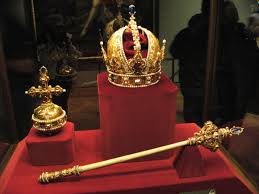Jesus Christ holds the SCEPTER OF RIGHTEOUSNESS as God in flesh
 Hebrews 1:8 But unto the Son he saith, Thy throne, O GOD, is for ever and ever: A SCEPTRE of righteousness is the SCEPTRE of thy kingdom (KJV)
Hebrews 1:8 But unto the Son he saith, Thy throne, O GOD, is for ever and ever: A SCEPTRE of righteousness is the SCEPTRE of thy kingdom (KJV)
“Scepter” in the New Testament is a translation from the Greek word rhabdos (Strong’s 4464) which could also be translated as rod or staff.
“Scepter” in the Old Testament is a translation from the Greek word shebet (Strong’s 7626), and can also be translated as per above or as “tribe” or “clan”. Other synonymous words for “rod” in the OT is matteh (Strong’s 4294) and choter (Strong’s 2415).
A scepter is a special staff/rod carried by a king or a high official, and in our past it was used as a token of authority and power of the king. Scepters are similar to a shepherd’s rod, except they are much fancier and way more valuable. Christ is told to have a kingdom, and his symbolic scepter is told to be of “righteousness”. Righteousness is doing what is right, just, pure and pleasing to God, and this means that the Lord Jesus will be totally fair and govern his kingdom righteously.
Below we can find some interesting verses where “scepter”, and also “rod” or “staff” are mentioned.
New Testament (KJV)
Aaron’s rod was one of a kind. It was a sign of authority and power:
Heb. 9:4 Which had the golden censer, and the ark of the covenant overlaid round about with gold, wherein was the golden pot that had manna, and Aaron’s rod that budded, and the tables of the covenant;
Compare the below verse with Jacob’s prophesy in Gen. 49:10, to which the author of Hebrews is referring. It’s interesting that Jacob is said to have been leaning upon the top of his staff when he prophesied about the scepter not leaving Judah until Shiloh comes;“The sceptre shall not depart from Judah—“:
Heb. 11:21 By faith Jacob, when he was a dying, blessed both the sons of Joseph; and worshipped, leaning upon the top of his staff.
The disciple John saw an extended version of the vision of the future-coming scepter that both Jacob and Balaam saw much earlier in the OT (see further down below). The book of Revelations mentions a man-child who was to rule the nations with a rod of iron, and there are many more descriptions of Jesus Christ:
Rev. 2:25 But that which ye have already hold fast till I come.26 And he that overcometh, and keepeth my works unto the end, to him will I give power over the nations:27 And he shall rule them with a rod of iron; as the vessels of a potter shall they be broken to shivers: even as I received of my Father.28 And I will give him the morning star.
Rev. 11:1 And there was given me a reed like unto a rod: and the angel stood, saying, Rise, and measure the temple of God, and the altar, and them that worship therein.
Rev. 12:5 And she brought forth a man child, who was to rule all nations with a rod of iron: and her child was caught up unto God, and to his throne.
Rev. 19:11 And I saw heaven opened, and behold a white horse; and he that sat upon him was called Faithful and True, and in righteousness he doth judge and make war.12 His eyes were as a flame of fire, and on his head were many crowns; and he had a name written, that no man knew, but he himself.13 And he was clothed with a vesture dipped in blood: and his name is called The Word of God.14 And the armies which were in heaven followed him upon white horses, clothed in fine linen, white and clean.15 And out of his mouth goeth a sharp sword, that with it he should smite the nations: and he shall rule them with a rod of iron: and he treadeth the winepress of the fierceness and wrath of Almighty God.16 And he hath on his vesture and on his thigh a name written, King Of Kings, And Lord Of Lords.17 And I saw an angel standing in the sun; and he cried with a loud voice, saying to all the fowls that fly in the midst of heaven, Come and gather yourselves together unto the supper of the great God;
Old Testament (NKJV) – using the word shebet
Below is Jacob’s prophesy about the last days concerning Judah. Jacob (Israel) was prophesying over each of his twelve sons and he places the scepter in Judah’s hands. Jacob was speaking of the lineage from which the Messiah would come. The scepter, the sign of power and dominion “shall not depart from Judah, Nor a lawgiver from between his feet, Until Shiloh (rest/peace) comes; And to Him shall be the obedience of the people”. People were apparently supposed to be obedient to the one holding the scepter or this “Shiloh” who is understood to be the Messiah. The prophesy also suggests that people can trust that the scepter will at least remain in Judah until his arrival. (There is no mention of what will take place after his coming.) From David’s time until the exile, the scepter as always been in Judah. The Roman empire affected the area at the time of the birth of Jesus, and in him both the priesthood and the kingship would be synchronized. Around the time of his death the Jews suggested “We have no king but Caesar” (John 19:15).
We also recognize more descriptions of the son of man (Jesus Christ) from Revelations:
Gen. 49:“Judah, you are he whom your brothers shall praise; Your hand shall be on the neck of your enemies; Your father’s children shall bow down before you.9 Judah is a lion’s whelp; From the prey, my son, you have gone up. He bows down, he lies down as a lion; And as a lion, who shall rouse him?10 The scepter shall not depart from Judah, Nor a lawgiver from between his feet,Until Shiloh comes; And to Him shall be the obedience of the people.11 Binding his donkey to the vine, And his donkey’s colt to the choice vine, He washed his garments in wine, And his clothes in the blood of grapes.12 His eyes are darker than wine, And his teeth whiter than milk.
Balaam gave numerous prophesies about a star that would come out of Jacob who among other things would be brought out of Egypt.
Numbers 24:1 Now when Balaam saw that it pleased the Lord to bless Israel, he did not go as at other times, to seek to use sorcery, but he set his face toward the wilderness. 2 And Balaam raised his eyes, and saw Israel encamped according to their tribes; and the Spirit of God came upon him.3 Then he took up his oracle and said:“The utterance of Balaam the son of Beor,The utterance of the man whose eyes are opened,4 The utterance of him who hears the words of God,Who sees the vision of the Almighty,Who falls down, with eyes wide open:5 “How lovely are your tents, O Jacob! Your dwellings, O Israel!6 Like valleys that stretch out, Like gardens by the riverside, Like aloes planted by the Lord,Like cedars beside the waters.7 He shall pour water from his buckets, And his seed shall be in many waters.“His king shall be higher than Agag, And his kingdom shall be exalted.8 “God brings him out of Egypt; He has strength like a wild ox; He shall consume the nations, his enemies; He shall break their bones And pierce them with his arrows.9 ‘He bows down, he lies down as a lion; And as a lion, who shall rouse him?’“Blessed is he who blesses you, And cursed is he who curses you.”—17 “I see Him, but not now;I behold Him, but not near; A Star shall come out of Jacob; A Scepter shall rise out of Israel, And batter the brow of Moab, And destroy all the sons of tumult. 18 “And Edom shall be a possession; Seir also, his enemies, shall be a possession,While Israel does valiantly.19 Out of Jacob One shall have dominion, And destroy the remains of the city.”
Hosea 11:1 “When Israel was a child, I loved him, And out of Egypt I called My son.
Matt. 2:13 Now when they had departed, behold, an angel of the Lord appeared to Joseph in a dream, saying, “Arise, take the young Child and His mother, flee to Egypt, and stay there until I bring you word; for Herod will seek the young Child to destroy Him.”14 When he arose, he took the young Child and His mother by night and departed for Egypt,15 and was there until the death of Herod, that it might be fulfilled which was spoken by the Lord through the prophet, saying, “Out of Egypt I called My Son.”
In the book of Esther we find an interesting story involving a king’s scepter. The queen Esther wanted to speak to the powerful king about an urgent matter and she hoped to find favor in his site so that she could continue to live, despite approaching him without first being asked for. The king chose to do his part, holding out his scepter, and Esther did her part by touching the top of it. This fortunate combination meant that Esther would get life instead of death. In comparison, we may all approach the throne of God without fear, because his son Jesus Christ always has his scepter extended to us. Our job is to repent from our sins to become cleansed and righteous:
Esther 4:11 “All the king’s servants and the people of the king’s provinces know that any man or woman who goes into the inner court to the king, who has not been called, he has but one law: put all to death, except the one to whom the king holds out the golden scepter, that he may live. Yet I myself have not been called to go in to the king these thirty days.”
Esther 5:2 So it was, when the king saw Queen Esther standing in the court, that she found favor in his sight, and the king held out to Esther the golden scepter that was in his hand. Then Esther went near and touched the top of the scepter.
Ps. 45 is introduced with this information: “The Glories of the Messiah and His Bride To the Chief Musician. Set to “The Lilies.”A Contemplation of the sons of Korah. A Song of Love”. Psalms/songs in the Bible do not contain any kind of falsehood, but we must be prepared for a certain extent of poetic expressions, comparisons, analogies and metaphors which are not supposed to be understood literally. This particular song seems to be talking about an earthly king, with comparisons with a heavenly king and God himself. V. 45:6 is the source of the famous expression in Heb. 1:8, where God (the Father) is talking to God (the son). Since the long and detailed expression is about God the son in Heb. 1, it is also about God in Ps. 45. We can see references to the Messiah also in Ps. 45 – someone being on the right hand side, a mighty one, being the most fair, riding with righteousness, being anointed with oil, being worshiped, praised, etc. (Read my article about Heb. 1:8 here.):
Ps. 45:1 My heart is overflowing with a good theme; I recite my composition concerning the King;
My tongue is the pen of a ready writer.2 You are fairer than the sons of men; Grace is poured upon Your lips; Therefore God has blessed You forever.3 Gird Your sword upon Your thigh, O MIGHTY ONE,With Your glory and Your majesty.4 And in Your majesty ride prosperously because of truth, humility, and righteousness; And Your right hand shall teach You awesome things.5 Your arrows are sharp in the heart of the King’s enemies; The peoples fall under You.6 Your throne, O God, is forever and ever; A scepter of righteousness is the scepter of Your kingdom.7 You love righteousness and hate wickedness; Therefore God, Your God, has anointed You With the oil of gladness more than Your companions.—11 So the King will greatly desire your beauty; Because He is your Lord, worship Him.—17 I will make Your name to be remembered in all generations; Therefore the people shall praise You forever and ever.
Note Ps. 45:7 about joy “Therefore God, Your God, has anointed You With the oil of JOY“ NASB, and compare with Hebrews again:
Heb. 12:2 Let us fix our eyes on Jesus, the author and perfecter of our faith, who for the JOY that was set before him endured the cross, scorning its shame, and sat down at the right hand of God
John 3:29 He who has the bride is the bridegroom; but the friend of thebridegroom, who stands and hears him, rejoices greatly because of the bridegroom’s voice. Therefore this joy of mine is fulfilled.
Is. 61:10 I will greatly rejoice in the Lord, My soul shall be joyful in my God; For He has clothed me with the garments of salvation, He has covered me with the robe of righteousness, As a bridegroom decks himself with ornaments, And as a bride adorns herself with her jewels.
“It despises the scepter of my son” according to a prophesy of Ezekiel:
Ez. 21:8 Again the word of the Lord came to me, saying, 9 “Son of man, prophesy and say, ‘Thus says the Lord!’ Say:‘A sword, a sword is sharpened And also polished!10 Sharpened to make a dreadful slaughter, Polished to flash like lightning! Should we then make mirth? It despises the scepter of My son, As it does all wood.—13 “Because it is a testing, And what if the sword despises even the scepter? The scepter shall be no more,”says the Lord God.14 “You therefore, son of man, prophesy, And strike your hands together. The third time let the sword do double damage. It is the sword that slays,The sword that slays the great men, That enters their private chambers.
 Old Testament (NKJV) – using the word matteh
Old Testament (NKJV) – using the word matteh
There was a lot of focus on the rod that Moses (and Aaron) used during Exodus. Moses had great use for it when he showed others the power of God, and proved that he himself had been given authority to be the leader of the Israelites on their journey:
Ex. 4:1 Then Moses answered and said, “But suppose they will not believe me or listen to my voice; suppose they say, ‘The Lord has not appeared to you.’”2 So the Lord said to him, “What is that in your hand?”He said, “A rod.”3 And He said, “Cast it on the ground.” So he cast it on the ground, and it became a serpent; and Moses fled from it. 4 Then the Lord said to Moses, “Reach out your hand and take it by the tail” (and he reached out his hand and caught it, and it became a rod in his hand),5 “that they may believe that the Lord God of their fathers, the God of Abraham, the God of Isaac, and the God of Jacob, has appeared to you.”—8 “Then it will be, if they do not believe you, nor heed the message of the first sign, that they may believe the message of the latter sign. 9 And it shall be, if they do not believe even these two signs, or listen to your voice, that you shall take water from the river and pour it on the dry land. The water which you take from the river will become blood on the dry land.”
Ex. 7:19 Then the Lord spoke to Moses, “Say to Aaron, ‘Take your rod and stretch out your hand over the waters of Egypt, over their streams, over their rivers, over their ponds, and over all their pools of water, that they may become blood. And there shall be blood throughout all the land of Egypt, both in buckets of wood and pitchers of stone.
Ex. 14:16 But lift up your rod, and stretch out your hand over the sea and divide it. And the children of Israel shall go on dry ground through the midst of the sea.
Num. 20:7 Then the Lord spoke to Moses, saying, 8 “Take the rod; you and your brother Aaron gather the congregation together. Speak to the rock before their eyes, and it will yield its water; thus you shall bring water for them out of the rock, and give drink to the congregation and their animals.”9 So Moses took the rod from before the Lord as He commanded him.
Each tribe also had rods, but their rods cannot be compared with the rod that Moses possessed:
Num. 17:2“Speak to the children of Israel, and get from them a rod from each father’s house, all their leaders according to their fathers’ houses—twelve rods. Write each man’s name on his rod.
Jonathan was involved in a dramatic story where he dipped his rod into honey in order to eat from it:
1 Sa 14: 26 And when the people had come into the woods, there was the honey, dripping; but no one put his hand to his mouth, for the people feared the oath. 27 But Jonathan had not heard his father charge the people with the oath; therefore he stretched out the end of the rod that was in his hand and dipped it in a honeycomb, and put his hand to his mouth; and his countenance brightened. 28 Then one of the people said, “Your father strictly charged the people with an oath, saying, ‘Cursed is the man who eats food this day.’” And the people were faint.—42 And Saul said, “Cast lots between my son Jonathan and me.” So Jonathan was taken. 43 Then Saul said to Jonathan, “Tell me what you have done.”And Jonathan told him, and said, “I only tasted a little honey with the end of the rod that was in my hand. So now I must die!”
A psalm by David replete with references to the Messiah Jesus Christ, such as “The Lord said to my Lord”. Jesus Christ is called Lord of Lords and he is a priest forever, just like it says in Heb. 7:21-24. It is out of Zion from where the rod of strength will come. :
Ps. 110:1 The Lord said to my Lord, “Sit at My right hand, Till I make Your enemies Your footstool.”2 The Lord shall send the rod of Your strength out of Zion. Rule in the midst of Your enemies!3 Your people shall be volunteers In the day of Your power; In the beauties of holiness, from the womb of the morning, You have the dew of Your youth.4 The Lord has sworn And will not relent,“You are a priest forever According to the order of Melchizedek.”5 The Lord is at Your right hand; He shall execute kings in the day of His wrath.6 He shall judge among the nations, He shall fill the places with dead bodies, He shall execute the heads of many countries.
Heb. 7:21 (for they have become priests without an oath, but He with an oath by Him who said to Him: “The Lord has sworn And will not relent, ‘You are a priest forever According to the order of Melchizedek’”),—24 But He, because He continues forever, has an unchangeable priesthood.
Old Testament (NKJV) using the word choter
A rod shall come forth out of the stem of Jesse (king David’s father), and a branch shall grow out of his roots. The Messiah would come from king David’s blood line:
Is. 11:1 There shall come forth a rod out of the stem of Jesse, and a branch shall grow out of his roots.




